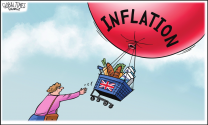So he's unhappy with China today because 40 years ago it was poor despite being advertised as socialist.I watched this interview from an Indian TV show about Taiwan with a Chinese expertof one Professor Steve Tsang (an expat from Hong Kong) who teaches and lead some sort of project that chronicles and studies Pres. Xi Jinping political thought. He's the China expert branded around Britain. In the interest of researching his background to understand his motivation, his background, education, and wealth etc..in order for me to understand what propels him to do what he does (which is attack China and the CPC) in terms of his analysis and analyzing the country he once professed to idealized.
So in the process, I came across this Yahoo interview that was conducted last year, and here on this interview is where I found the answer to his disillusionment of China, socialism, and his never ending quest of trying to bring the party down. I copied and pasted the portion the interview where he talked about his experience of China during his "rebellious phase" a.k.a. too young, too naïve phase.
Quartz: How has your upbringing in Hong Kong influenced your China scholarship?
Tsang: I grew up in Hong Kong and made my first trip to China in 1978 as an undergraduate at the University in Hong Kong. I was very keen to go because I wanted to know what “mother China” was like [during] the end of the Maoist era and the beginning of the Deng Xiaoping era. I was 19 or 20, I was rebellious, and Hong Kong was a [colony]. So even though there was no particular reason why I would be anti-colonial, I was anti-colonial for the hell of it.
One week of exploration was a total eye opener. I spent about a week or so in China, and that was a big eye opener. In those days, you had to physically get out of the trains in Lon Wu in Hong Kong, walk across Lon Wu Bridge into the Chinese side, and then get on a train in Shenzhen. I couldn’t wait. When the train rolled out of Shenzhen towards Canton, I was looking out of the windows trying to catch sight of everything I could.
By the end of that week, when I returned to Shenzhen to cross the border, and I saw the union flag, and the Hong Kong policemen in British khaki, I thought, ‘This is where I belong.’ One week of exploration was a total eye opener.
Why? What happened during that week?
Tsang: There were [many] experiences. [I was] having some noodles in the noodle shop and there were kids, big ones in their teens and little ones, outside, looking at us eating noodles. It was incredibly uncomfortable. They were pointing at their mouth and rubbing their tummy—’hungry.’ So I pulled out a yuan note and I gave it to the oldest girl, who was in her teens, and said to her, ‘Go buy some food and share it with everybody.’ She grabbed the money and started running. I was so angry. I chased her, took the money back, and then gave it to the little ones and said, ‘Take the money together, go get some food, and share it equally.’
I went back to China for socialism. And what I saw was utter poverty, children starving, and they were behaving in a very selfish way. I was expecting idealism and that wasn’t what I was seeing.
Then we went to Guilin and we wanted to go up the river Li to Yangshuo, this beautiful spot. The staff said, ‘We queue up in the morning at the pier, get our ticket, and go in the boat.’ I wanted to do what the locals do. So I bought the Mao suit, and the green tennis shoes, and we got onto the lower deck [of the boat]. All the tourists, foreigners and Hong Kong people were in the upper deck. So what’s in the upper deck? I wanted to go up and see. I tried to go—’No. Upper decks are for foreigners and Hong Kong or Macao compatriots. You lot stay down there.’
How did that make you feel?
Tsang: That, to me, was bringing back the myth of the Shanghai parks in the 1920s, ‘No dogs or Chinese,’ which was supposedly overthrown by the Communist Party 1. Events like that completely destroy the idealism of a young man about the propaganda of the modernizing China that was coming out of the Maoist era.
Your description of desperate and starving children in Shenzhen—that sounds like the China of the 1970s, not the China of 2021. Do you feel differently about the Chinese government, now that it has brought 800 million people out of extreme poverty?
Tsang: As an undergraduate in Hong Kong, I carried a Little Red Book of Chairman Mao’s Quotations. It was not part of the curriculum but I would go and buy it. I immersed myself in all the Party’s propaganda about China. I believed in what the party was talking about. That’s why I went to China. And they were lies. That was the problem. The problem wasn’t the poverty, or the behavior of the children, or the behavior of the people on the boat.
The economic miracle in China in the last 40 years was totally real. When I first went to China, it was no better than North Korea today. Shanghai, in some ways, is now comparable in your material life and convenience to Manhattan in New York. You can’t say that China has not made enormous progress there. But it doesn’t matter. That has never been the point for me.
So the point for you was that the system that was being advertised to you was not the system on the ground?
Tsang: It’s the untruthfulness of it.
Does he hold any other country to this standard? South Korea was as poor as China 50 years ago. How about India today compared to how it advertises itself?
The reasons why China was poor was the same reason Hong Kong wasn't, western imperialism. He wasn't looking for idealism, he was a champagne socialist who didn't want to get out of his comfort zone.
Now he's just a stubborn old man who refuses to admit he was wrong.


